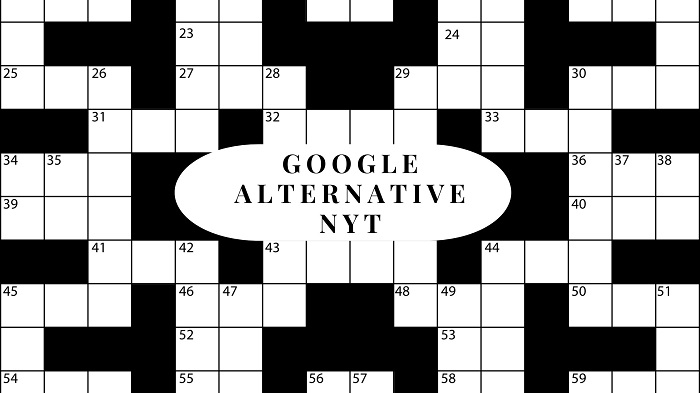New York Times crossword puzzles, in particular, are famous for their highly questionable yet engaging difficulty and variety of subjects. And this is where “Google alternative” fits as it is a mention that intrigues everyone. It is instantly seen by tech-savvy solvers as revolving around the most popular search engine. In this article, we try to reveal the real meaning of the Google Alternative NYT crossword. We also provide you with a number of hints and explanations that will assist you in solving this crossword puzzle. Plus, help you in exploring the many search engines you can employ.
Google Alternative NYT – Hints with Meanings
The term ‘Google alternative’ is used to denote other search engines that act as a competitor to Google. Or, as an option to Google. It’s evident that Google stands for the most widespread search engine. However, there are several other search engines that might have different peculiarities. They could correspond to the different types of users, or offer various possibilities in the issue of privacy. Further on, I will provide you with the most frequently given answers to the clue Google Alternative NYT crossword and the context behind them.
Yahoo
Yahoo is one of the oldest and most well-known alternatives to Google which can feature on Google Alternative NYT. Launched in 1994, Yahoo was initially a web directory before evolving into a full-fledged search engine and portal. Though its popularity has waned compared to Google, Yahoo remains a significant player in the online search market, especially in certain regions and demographics. In crossword puzzles, “Yahoo” is a frequent answer to the “Google alternative” clue, particularly when a shorter, familiar term is required.
Bing
Bing is Microsoft’s answer to Google. Launched in 2009, Bing offers a different search experience with unique features such as the “Bing Rewards” program. It also integrates with Microsoft products like Windows and Office. Bing’s homepage, known for its stunning daily images, is a notable departure from Google’s minimalist design. In NYT crosswords, “Bing” is often the go-to answer for the “Google alternative” clue. How? Due to its prominence and the fact that it is a direct competitor to Google in the search engine market.
DuckDuckGo
DuckDuckGo, as Google Alternative NYT, is a search engine that distinguishes itself by emphasizing user privacy. Unlike Google, DuckDuckGo does not track user searches or build personal profiles, making it an attractive alternative for those concerned about online privacy. The search engine uses a combination of its own web crawler and results from other sources, including Bing. In crosswords, “DuckDuckGo” is often the answer when the clue suggests a privacy-focused or less mainstream Google alternative. Despite being a longer answer, it appears frequently in puzzles that explore modern, tech-savvy themes.
Yandex
Yandex is the most popular search engine in Russia and several other post-Soviet states. Often dubbed the “Russian Google,” Yandex offers a range of services similar to Google, including maps, email, and cloud storage. Yandex is known for its deep understanding of the Russian language and local context, making it a preferred choice in its home market. In NYT crosswords, “Yandex” might be the answer when the puzzle leans towards international or region-specific themes, providing a glimpse into global alternatives to Google.
Ecosia
Ecosia is another option for Google Alternative NYT. It is a search engine that differentiates itself by focusing on environmental sustainability. The company donates a significant portion of its profits to tree-planting projects, making it a “green” alternative to Google. Ecosia uses Bing’s search technology but brands itself around the idea of contributing to ecological preservation with each search. In crosswords, “Ecosia” could be the answer when the clue hints at an environmentally conscious or socially responsible alternative to Google.
Ask
Ask (formerly known as Ask Jeeves) is a question-and-answer-based search engine that gained popularity in the late 1990s and early 2000s. It distinguishes itself by allowing users to pose questions in natural language, though it has evolved over time to include a more standard search engine interface. While its popularity has diminished, Ask remains a known name in the search engine space. In crossword puzzles, “Ask” might be the answer when the clue references an older or more niche Google alternative.
Baidu
Baidu is China’s leading search engine, similar in scope and function to Google. Due to China’s internet regulations, Baidu dominates the Chinese market, providing a wide range of services from search to maps, news, and AI-driven features. In NYT crosswords, “Baidu” could be the answer when the clue suggests a focus on Chinese technology or global search engine alternatives.
End Note
The potential answers to the Google Alternative NYT crossword can be as follows, all pointing to a different aspect of the global search engine market: Whether it is “Yahoo,” “Bing,” “DuckDuckGo,” “Yandex,” “Ecosia,” “Ask,” or “Baidu” these choices will improve your crosswords solving. This clue not only makes the solvers realize how powerful Google is but also lets them know more about the varieties of search engine that people used, required, or preferred in different values or regions. If you come across this clue in the future puzzles, do not forget the following alternatives, which would assist you to arrive at the right solution faster.
FAQs
Q: What is the most common answer to the “Google alternative” clue in the NYT crossword?
A: The most common answer is “Bing,” as it is Microsoft’s direct competitor to Google and is widely recognized in the search engine market.
Q: Can the “Google alternative” clue have more than one correct answer?
A: Yes, depending on the puzzle’s context and the number of letters required, the clue can have several correct answers such as “Yahoo,” “DuckDuckGo,” “Yandex,” “Ecosia,” “Ask,” or “Baidu.”
Q: Why do crossword constructors use clues like “Google alternative”?
A: Clues like “Google alternative” are used to challenge solvers and encourage them to think about different technologies and services beyond the most dominant ones. These clues also reflect the evolving nature of the tech landscape.
Q: How can I improve my ability to solve clues like “Google alternative”?
A: Familiarizing yourself with different search engines and understanding the unique features or user bases of each one can improve your ability to solve these clues. Additionally, regularly solving NYT crosswords can help you recognize patterns and common answers.
Q: Are there any specific strategies to identify the correct answer for the “Google alternative” clue?
A: One strategy is to consider the context of the puzzle and the number of letters needed for the answer. For example, if the answer requires four letters, “Bing” might be the most likely choice. Additionally, clues from surrounding answers can help narrow down the correct option.










Got a Questions?
Find us on Socials or Contact us and we’ll get back to you as soon as possible.